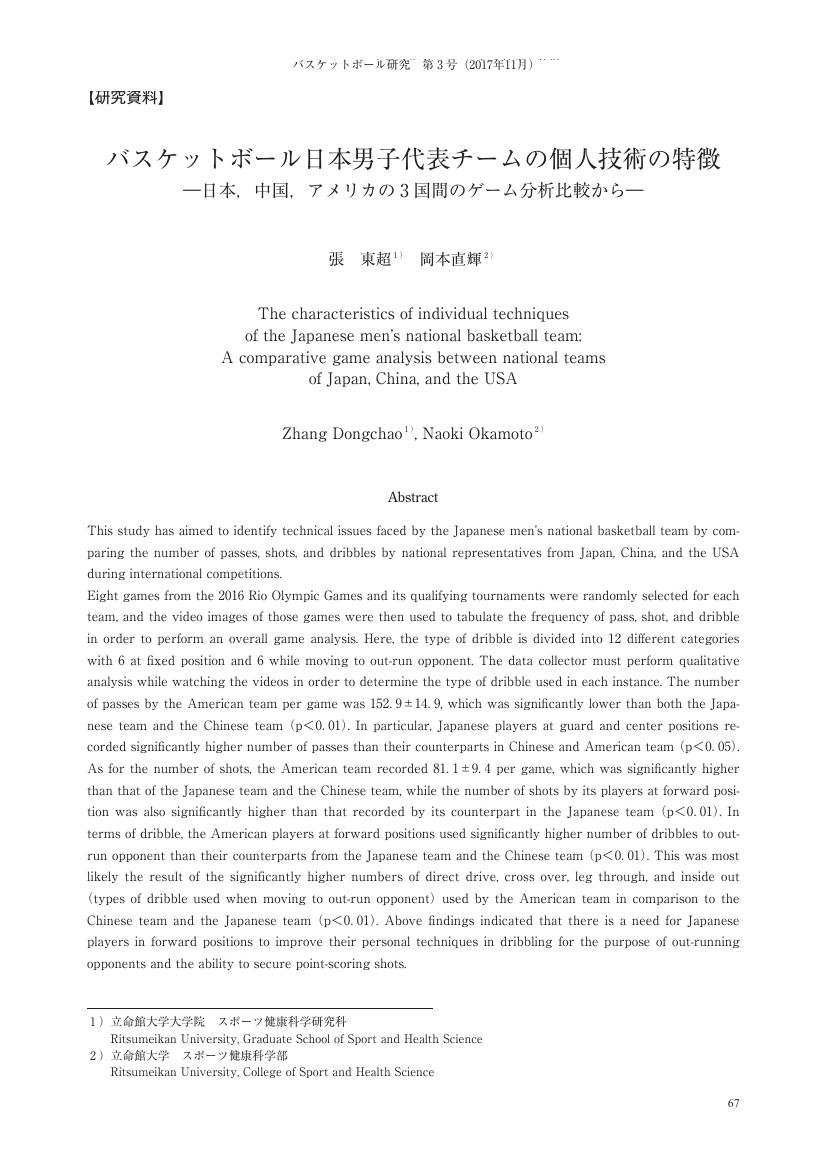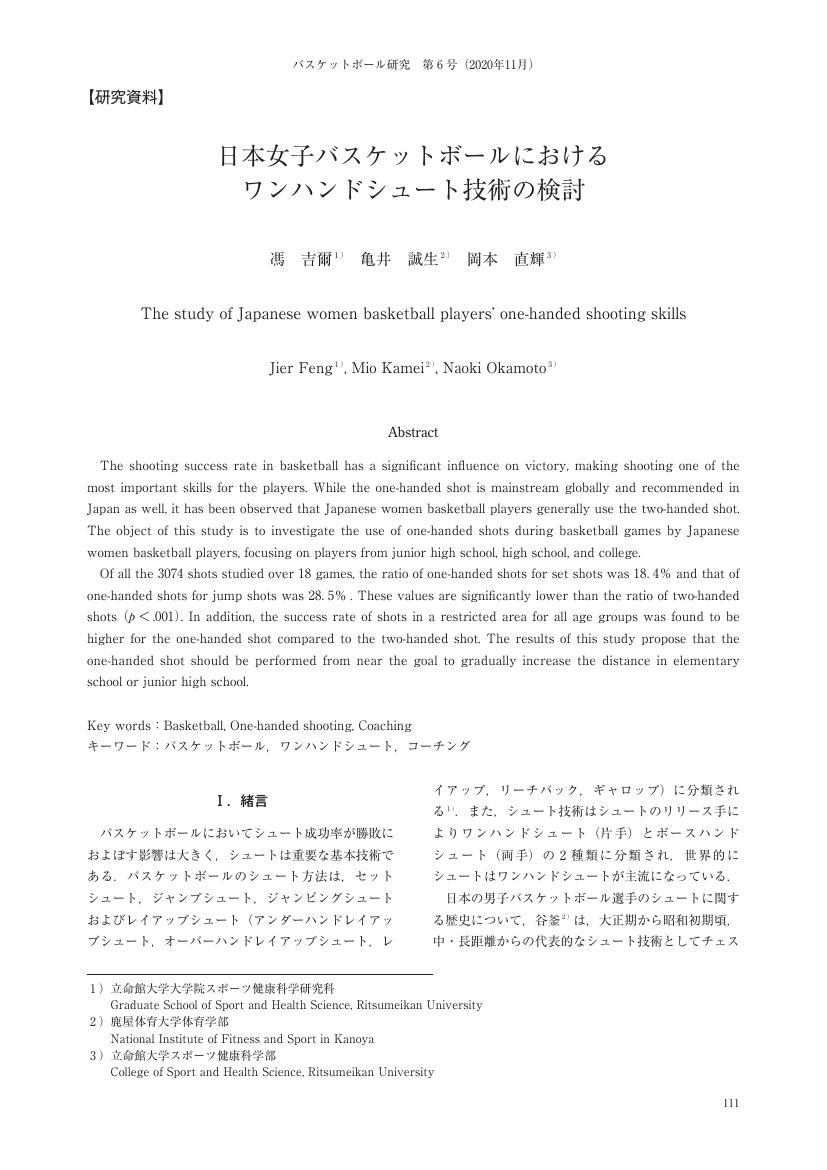- 著者
- 張 東超 岡本 直輝
- 出版者
- 日本バスケットボール学会
- 雑誌
- バスケットボール研究 (ISSN:21896461)
- 巻号頁・発行日
- vol.3, pp.67-74, 2017 (Released:2020-12-08)
2 0 0 0 OA 日本女子バスケットボールにおけるワンハンドシュート技術の検討
- 著者
- 馮 吉爾 亀井 誠生 岡本 直輝
- 出版者
- 日本バスケットボール学会
- 雑誌
- バスケットボール研究 (ISSN:21896461)
- 巻号頁・発行日
- vol.6, pp.111-118, 2020 (Released:2021-12-08)
1 0 0 0 OA 日傘生地の色および加工の違いによる暑熱緩和効果の比較
- 著者
- 岡本 直輝 渡邊 慎一
- 出版者
- 人間‐生活環境系学会
- 雑誌
- 人間‐生活環境系シンポジウム報告集 第45回人間-生活環境系シンポジウム報告集 (ISSN:24348007)
- 巻号頁・発行日
- pp.49-52, 2021 (Released:2022-12-03)
- 参考文献数
- 4
本研究は、日傘生地の色および加工の違いが暑熱緩和効果に及ぼす影響を明らかにすることを目的とする。測定は2021年7月21日から23日に、名古屋市に所在する大同大学のテニスコート、芝生、コンクリート面において実施した。傘(銀)、日傘(白)、日傘(銀)、日傘(白+ネット)の4種の傘下および比較のため日向の熱環境を測定した。その結果、以下の知見を得た。白色日傘は日射遮蔽効果が最も大きく、生地温度の上昇による下向きの熱放射量の増加が最も小さいことが示された。傘下のMRTは、傘生地の放射特性(日射遮蔽率、下向き長波長放射増加率)および地表面の放射特性(アルベド、日射吸収率)が影響する。テニスコートにおいて、UTCI低減効果が最も大きかったのは日傘(白+ネット)の-3.6℃であり、次いで日傘(白)の-3.0℃、日傘(銀)の-2.6℃、傘(銀)の-1.4℃であった。この結果から、傘の表面が銀色より白色の方が暑熱緩和効果が大きいことが示された。
1 0 0 0 OA スポーツ指導場面における暴力に関わる指導者のパーソナリティ
- 著者
- 亀井 誠生 岡本 直輝
- 出版者
- 一般社団法人 日本体育・スポーツ・健康学会
- 雑誌
- 体育学研究 (ISSN:04846710)
- 巻号頁・発行日
- vol.67, pp.929-945, 2022 (Released:2022-11-11)
- 参考文献数
- 58
Since 2013, corporal punishment by coaches in athletic clubs has been decreasing. However, there have been instances of coaches perpetrating violence while coaching students, despite the existence of penalties for corporal punishment. Such instances may be due to individual personality, whereby feelings of dissatisfaction are easily translated into violence. In this study, we attempted to clarify the relationship between severe forms of coaching (corporal punishment, rants) and coaches' personalities. We obtained questionnaire responses from 425 college students regarding their experiences with corporal punishment and rants by their coaches and the Big Five personality traits of the coaches. Among the respondents, 21.9% (93 students) had experienced corporal punishment and 53.6% (227 students) had endured rants. Hierarchical cluster analysis was conducted to identify four coach personality clusters (Resilients, Overcontrollers, Undercontrollers, Non-identifiables). A comparison among the clusters revealed that overcontrolling coaches (high neuroticism, low agreeableness) exhibited a significantly higher frequency of corporal punishment and rants. These results indicate that a fundamental understanding of the individual characteristics behind the violent behavior (social behavior) of coaches is essential for eradication of violence such as corporal punishment and rants.
1 0 0 0 OA 高等学校運動部活動中の指導場面における暴言について
- 著者
- 亀井 誠生 岡本 直輝
- 出版者
- 一般社団法人 日本運動・スポーツ科学学会
- 雑誌
- 運動とスポーツの科学 (ISSN:13421026)
- 巻号頁・発行日
- vol.27, no.1, pp.23-35, 2021-10-31 (Released:2021-11-20)
- 参考文献数
- 47
In recent years, corporal punishment by coaches during athletic activities has been decreasing. On the contrary, verbal abuse, including rants by coaches have been reported frequently by the media. Some severe cases of verbal abuse have driven students to suicide. This severe form of coaching may be the background for coaches’ belief that “corporal punishment and verbal emotionally abusive behaviors are different” following the doctrine that “victory is everything.” The objectives of this study were 1) to clarify the relationship between corporal punishment and verbal abuse in terms of frequency and degree and 2) to identify crucial types of harassment, intimidation, and humiliation-related to severe cases of corporal punishment. A questionnaire on athletic coaching (specifically, corporal punishment and verbal abuse) in high school was answered by 361 college students. Among the respondents, 22.2% experienced corporal punishment and 45.7% endured verbal abuse. Moreover, more experiences involving verbal abuse by coaches were indicative of more experiences of corporal punishment (rs=0.53). Furthermore, more experiences of worrying about verbal abuse led to more experiences of worrying about corporal punishment (rs=0.35). Additionally, there was a significant correlation between experiencing severe corporal punishment and experiencing hearing phrases such as “that’s why everyone thinks you’re an idiot!,” “you’re out of this sport!,” “you’re not qualified to teach the younger members!,” “out of my sight!,” and “you don’t have any potential!” (V>0.35). This study revealed the relationship (frequency and degree) between verbal abuse and corporal punishment in sports coaching situations. Findings indicated that certain words were uttered as verbal abuse in combination with corporal punishment. Further studies may help with the development of methods that deter corporal punishment and verbal abuse by focusing attention not only on clarifying the direct cause of the former but also the daily relationship between coaches and students.
1 0 0 0 OA 球技選手の方向変換能力向上のためのジグザグ走の検討
- 著者
- 岡本 直輝 伊坂 忠夫 藤田 聡
- 出版者
- 一般社団法人 日本体育・スポーツ・健康学会
- 雑誌
- 体育学研究 (ISSN:04846710)
- 巻号頁・発行日
- vol.57, no.1, pp.225-235, 2012 (Released:2012-06-02)
- 参考文献数
- 16
- 被引用文献数
- 3 1
The purpose of the study was to evaluate sprint time during zigzag running among short-distance track and field runners (n=9), long-distance track and field runners (n=10), basketball players (n=13), and soccer players (n=8), and to determine the ability of the various competitive groups to change their running direction. Zigzag running involved weaving through cones arranged along a 15-m line with 4 different intervals between the cones (i.e. 1, 1.5, 2, or 3 m). Also in a separate study, nine subjects performed zigzag running with the above four inter-cone intervals every day for 11 days to determine the interval that was most effective for improving their ability to change direction. The results indicated that the basketball players had the best ability to change direction during zigzag running using all of the inter-cone intervals, while the short-distance track and field runners were the slowest at 1-m-width and 1.5-m-width zigzag running. Training failed to improve 1-m-width and 1.5-m-width zigzag running, but improved sprint time for the 2-m and 3-m inter-cone intervals (P<0.05). In conclusion, zigzag running with an inter-cone interval of either 2 m or 3 m can significantly improve the ability of athletes to change direction in order to sidestep opponents, possibly due to the fact that ball game athletes are able to combine both open and closed steps in their running techniques, whereas only open steps are possible for intervals below 2 m.
- 著者
- 栗原 俊之 伊坂 忠夫 岡本 直輝
- 出版者
- 一般社団法人 日本体育学会
- 雑誌
- 日本体育学会大会予稿集
- 巻号頁・発行日
- vol.68, pp.221_1, 2017
<p> 全米プロバスケットボール協会(NBA)や日本プロバスケットボールリーグ(Bリーグ)は、各試合の内容を記録した統計値(STATS)を公開している。本研究は試合結果に関係するSTATS項目が日米のプロリーグで異なるかを検討することを目的とし、2016–17年シーズン全試合(NBA 1230試合、B1 540試合)のSTATSを使って統計解析を行った。一般的なSTATS項目(前後半得点、シュート、フリースローの試投数・成功数・成功率、リバウンド、アシスト、ターンオーバー、ファウル、スティール、ブロック)に加え、攻撃回数、攻撃効率、防御効率および両チーム間の各項目の差を独立変数とし、得失点差を従属変数とした重回帰分析、勝敗を基準変数とした判別分析を行った。結果、重回帰分析では日米ともに攻撃効率、防御効率、シュート成功率、フリースロー成功数の差が選択され、NBAでは3点シュート成功数の差、Bリーグではファウル数の差が選択された。判別分析ではほとんどすべての項目が関与したがNBAでは3点シュートに関する項目が、Bリーグではリバウンドに関する項目が勝敗に大きく関係していた。</p>

